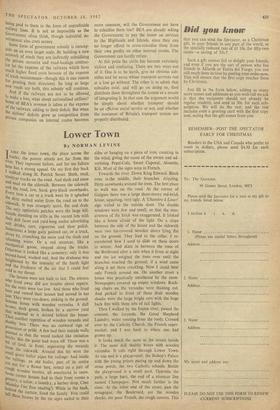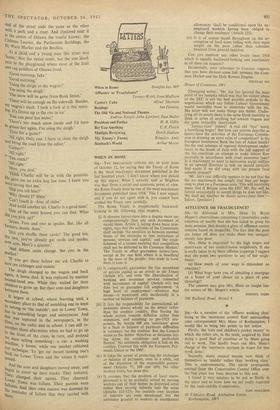Lower Town
By NORMAN LEVINE
'LIKE the lower town, the place across the tracks, the poorer streets not far from the river. They represent failure, and for me failure here has a strong appeal. On my first day back I walked along St. Patrick Street. Slush, mud, streetcar tracks on the road. And slush and snow and mud on the sidewalk. Between the sidewalk and the road, low, hard, grey-black snowbanks. Every time a car or a truck went by it splashed the dirty melted water from the road on to the sidewalk. It was strangely quiet, flat and drab. The only optimistic patches were the large bill- boards standing on stilts in the vacant lots with their doll faces and yard-long smiles advertising soft drinks, cars, cigarettes and shoe polish. Sometimes a large gaily painted car, or a truck, drove by, crunching the snow and the slush and SP1,4shing water. Or a red streetcar, like a mechanical goose, swayed along the tracks. Otherwise it looked like a cemetery; only it was 8eeond-hand, washed out. And the drabness was heightened by the intensity of the harsh light and the freshness of the air that I could feel cold in my throat. The houses were not built to last. The owners who lived away did not trouble about repairs, ''.°r the rents were too low. And those who lived h. ere and owned their houses had moved in too la te. They were run-down, sinking in the ground. Solemn boxes with wooden verandas. A dull brown dark green, broken by a narrow yard Vat widened as it skirted behind the house. Then another repetition of wooden veranda and shabby box. There was no outward sign of 13°session or pride. A few had their outside walls P. a!nted so that the wood looked like imitation bbricks. But the paint had worn off. There was a fit of land, in front, separating the veranda 'stool the sidewalk. Around this bit were the ina" green boiler pipes for railings: And inside e railings, an old boiler, part of its centre cue
out for a flower box, rested on a pair of
Some Wooden trestles, all smothered in snow. Nome corner houses had in their front rooms a grocery, a tailor, a laundry, a barber shop, Chez Maurice (`no free reading'). While in the back, behind the curtain, lived the family. You could tell these houses by the tin signs nailed to their
sides or hanging on a piece of iron, creaking in the wind, giving the name of the owner and ad- vertising Pepsi-Cola, Sweet Caporal, Alouette, Kik. Most of the signs were in French.
Towards the river. Down King Edward. Black trees in the middle, their branches dripping. Dirty snowbanks around the trees. The best place to walk was on the road. At the corner of Guigues there was a large three-storey red-brick house, squatting, very ugly. A `Chambre a Lotter' sign nailed to the outside door. The double windows were few and small, so that the mas- siveness of the brick was exaggerated. It looked like a house afraid of the light. On a slope between the side of the house and the sidewalk were two tin-covered wooden doors lying flat OD the ground. They lead to the cellar. I re- membered how I used to slide on these doors in winter. And skate in between the trees of the Boulevard after a rain when it froze at night and the ice weighed the trees over until the branches touched the ground; if a wind came along it set them crackling. Now I could hear only French around me. On another street a house was practically smothered by the snow. Newspapers covered up empty windows. Rock- ing chairs on the verandas were thawing out. And parked in front of these drab wooden shacks were the large bright cars with the huge back fins with three sets of tail lights.
Then I walked by the frozen river, passed the convent, the iceyards, the Good Shepherd Laundry, water running from the roofs. Crossed over by the Catholic Church, the French super- market; and I was back to where one had grown up.
It looks much the same as the streets beside it. The same dull shabby boxes with wooden verandas. It cuts right through Lower Town. At one end is a playground; the Bishop's Palace with the young priests pacing up and down the stone porch; the two Catholic schools. Beside the playground is a small park. Opposite the park, a large barn, the end of a streetcar line named Champagne. Not much farther is the river. At the other end of the street, past the synagogue, the Boulevard, are the wooden shacks, the poor French, the rough taverns. This end of the street ends the same as the other with a park and a river. And clustered near it is the centre of Ottawa the tourist knows: the Chateau Laurier, the Parliament Buildings, the BY Ward Market and the Basilica.
As a child and a young man this street was home.' Not the entire street, but the one block next to the playground where most of the fruit and rag peddlers of Ottawa lived.
'Good morning, Jake.' Good morning.'
'Using the sleigh or the wagon?'
I'm using the sleigh.' The snow will be gone from Bank Street.'
`There will be enough on the sidewalk. Besides, In Y wagon's stuck. I took a look at it this morn- mg. It's frozen up to the rim in ice.'
:You can pour hot water.' There's too much snow inside and I'd have to grease her again. I'm using the sleigh.'
'Time for a game?'
All right. Only one. I have to clean the sleigh and bring the load from the cellar.' Casino?'
All right.' `Ten cents?' 'Al! right.' `Here, you deal.' , Think Charlie will be in with the potatoes.
He tle gave me an extra bag last time. I knew you Were saving that ten.' Did You tell him?' 'Why should I? Sixes.'
:Can't touch it—four of clubs.' ,And build another six. Charlie is a good man.' One of the most honest you can find. What did You pick up?'
`Seven. Five and two in spades. But, like all tanners, dumb. Aces.' `Did you shuffle these cards? The good ten, the two, you've already got cards and spades, new aces. Here's a quarter.' And fifteen cents change. See you in the. Market,'
`If you get there before me ask Charlie to save me cabbages and onions.'
The sleigh changed to the wagon and back again. A horse died. It was replaced by another second-hand one. While they waited for their Children to grow up. But their sons and daughters betrayed them.
It began at school, where learning took a secondary place to that of moulding one to want
to belong to 'the outside'; not to Lower Town, b thht to something larger and anonymous. And fits was repeated in the newspapers, in the films, on the radio and in school. I can still re- member those afternoons when we had to go up to the front of the class, in turn, and pretend We Were selling something: a car, a washing machine a house, while our teacher criticised our technique. To 'get on' meant turning one's 't on Lower Town and the values it repre- sented.
And the sons and daughters moved away, and began to cover up their tracks. They imitated. They changed their names. They charmed. Lower Town was failure. Their parents were thllures. And their own success was doomed by the:minder of failure that they carried with















































 Previous page
Previous page